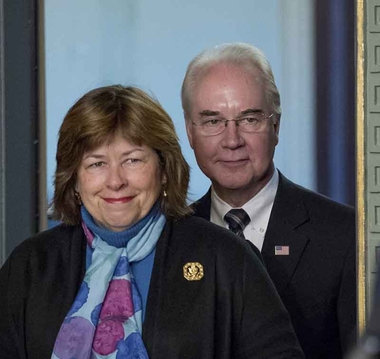Georgia lawmaker: Can we quarantine people with HIV?

It was a shocking throwback to the uninformed reaction to HIV during the height of the HIV/AIDS epidemic. A Georgia lawmaker, at a meeting of the Georgia House’s Study Committee on Geoprgians’ Barriers to Access to Adequate Health Care, asked if people living with HIV could be quarantined.
Even more shocking, the lawmaker asking the question, state Rep. Betty Price, is both a doctor, and the wife of former Health and Human Services secretary Dr. Tom Price. The formed HHS secretary was long known for his anti-LGBT+ views.
Project Q Atlanta first reported on Rep. Price’s uninformed question.
“’My thinking sometimes goes in strange directions, but before you proceed if you wouldn’t mind commenting on the surveillance of partners, tracking of contacts, that sort of thing. What are we legally able to do,’ Price said.
"’And I don’t want to say the quarantine word, but I guess I just said it. Is there an ability, since I would guess that public dollars are expended heavily in prophylaxis and treatment of this condition. So we have a public interest in curtailing the spread. What would you advise or are there any methods legally that we could do that would curtail the spread,’ Price added.”
Criminalization of HIV status by laws requiring people living with HIV to reveal their status to sex partners has long been a major issue in the fight against HIV/AIDS.
For more on the criminalization of HIV, visit:
Ex-Missouri student found guilty of exposing partner to HIV
DOJ releases guide to reforming HIV criminalization laws
Criminalization of HIV in Oklahoma.
The Centers for Disease Control and Prevention (CDC) discusses the problem on its website, saying, “During the early years of the HIV epidemic, a number of states implemented HIV-specific criminal exposure laws. These laws impose criminal penalties on people living with HIV who know their HIV status and who potentially expose others to HIV.
“In 1990, the Ryan White Comprehensive AIDS Resources Emergency (CARE) Act, which provides states with funds for AIDS treatment and care, required every state to certify that its criminal laws were adequate to prosecute any HIV-infected individual who knowingly exposed another person to HIV.”
The CDC says that by 2011, a total of 67 laws explicitly focused on persons living with HIV. The laws were enacted in 33 states.
Today, experts maintain that HIV criminalization laws have the opposite effect to the purpose claimed for the laws – preventing the spread of HIV. Since most of the laws focus on “knowingly” exposing sex-partners to HIV, the laws prevent people getting tested and knowing their HIV status.
Modern medical understanding of HIV shows that, with anti-retroviral treatment (ART), viral loads can be reduced to a point where there is a very low risk of the transmission of HIV.
The CDC says, “The majority of laws identified for the analysis were passed before studies showed that antiretroviral therapy (ART) reduces HIV transmission risk and most do not account for HIV prevention measures that reduce transmission risk, such as condom use, ART, or pre-exposure prophylaxis (PrEP). The analysis encouraged states with HIV-specific criminal laws to use its findings to re-examine state laws, assess the laws’ alignment with current evidence regarding HIV transmission risk, and consider whether the laws are the best vehicle by which to achieve their intended purposes.”
Project Q’s report on the committee meeting continued: “’It seems to me it’s almost frightening the number of people who are living that are potentially carriers, well they are carriers, with the potential to spread, whereas in the past they died more readily and then at that point they are not posing a risk. So we’ve got a huge population posing a risk if they are not in treatment,’ Price said later during the presentation.
“Dazon Dixon Diallo, the founder and executive director of SisterLove, said Price's comments were concerning and showed that HIV activists and organizations have more work to do educating lawmakers about people living with HIV.
“’When we come into spaces like this and we hear questions around how legally far can we go to isolate people or even quarantine people, then it just lets you know that we have a real uphill battle,’ Diallo said.”
It remains shocking that in 2017, a medical doctor, let alone the wife of an HHS secretary, would be as uninformed as Rep. Betty Price.
Copyright The Gayly – October 21, 2017 @ 8:15 a.m. CDT.





